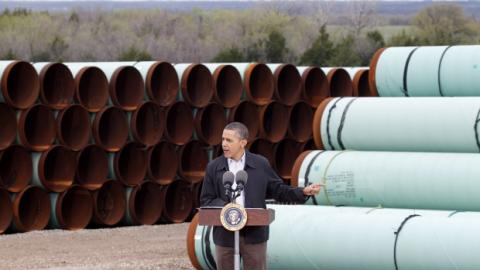The oil brought into the United States from Canada via the proposed Keystone XL pipeline would jeopardize the health of Americans, two U.S. senators said Wednesday as they called for a public health impact study.
Senator Barbara Boxer, a Democrat representing California, and Senator Sheldon Whitehouse, a Democrat from Rhode Island, held a news conference in Washington along with Dr. John O'Connor, an Alberta physician.
O'Connor told the news conference that carcinogens get into the food chain, water and air in communities downstream from the oilsands and that those toxins are linked to cancers occurring in those areas. He said he has "no political agenda" and that he is only advocating for his patients.
O'Connor shared his concerns about higher than average cancer rates, and rare cancers, in Fort Chipewyan, and he told CBC News he is trying to shine a spotlight on the "callous indifference" to the health of those who live downstream from the oilsands.
"The opportunity to talk about it was a golden one," he said of his invitation to attend the news conference in Washington. O'Connor said he hopes the U.S. will pressure the Canadian and Alberta governments to do comprehensive studies on the health of people in communities near the oilsands. Past promises for studies have not been kept, he said.
Boxer, who calls Alberta's oilsands "tarsands," said the health effects of developing them have been ignored and that more attention needs to be paid before the State Department makes a recommendation to President Barack Obama on approving the Keystone XL project.
"Health miseries follow the tarsands from extraction to transport to refining to waste disposal," she said.
Senators want a health impact study
The TransCanada Corporation pipeline would carry crude oil from Alberta to Nebraska, where it would link up with an existing pipeline that connects to refineries in Texas. Because it would cross the Canada-U.S. border it needs presidential approval.
Secretary of State John Kerry's department will determine whether it believes the pipeline is in the national interest and then it will be up to Obama to make the final decision. He has not said when he will make his decision.
"I ask today: how many more Americans with asthma will we see, and is that in the national interest? How are more Americans with cancer in the national interest?" said Boxer.
Boxer and Whitehouse have written to Kerry asking for a health impact study on the Keystone XL project.
"Children and families in the U.S. have a right to know now before any decision to approve the Keystone tarsands pipeline is made, how it would affect their health," Boxer said.
An environmental impact study was released a few weeks ago by the State Department and a 90-day review period is now underway. But a Nebraska court may have disrupted the timeline for a decision. It ruled a week ago that the governor didn't have the authority to approve the route through the state. It's unclear how this will affect the project or the White House's decision.
"This press conference is about waking up America to the fact more tarsands coming into this country, and right away with the Keystone pipeline you have 45 per cent [more oil], is a danger to the health of our people," Boxer warned while sharing stories about residents who suffered ill health after nearby oil spills.
Whitehouse said the U.S. should be making a decision with its eyes wide open to the potential health consequences.
A spokesman for TransCanada said in an email that a 2010 study by the Royal Society of Canada "concluded that there is currently no credible evidence that contaminants from the oilsands are boosting cancer levels in downstream communities."
Davis Sheremata said TransCanada shares the senators' concerns for the environment and public health and that it has invested millions of dollars in solar and wind energy. He also noted that reducing greenhouse gas emissions from coal-fired plants in the U.S. would have a broad impact on the health of Americans.
The federal government in Ottawa is lobbying Obama's administration to approve the pipeline and the topic came up when Prime Minister Stephen Harper and Obama met last week in Mexico. Obama has provided no hints publicly on what his decision will be.


Spread the word